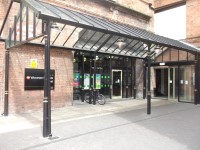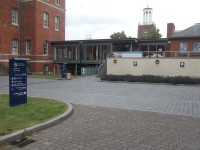Access Guide
Introduction
- This guide details the route from Foregate Street Station to City Campus.
Exit Forgate Street Station and right on to Foregate Street
- The surface outside the station exit has areas of flagstones and block paving before becoming flagstones on the pathway.
- They are uneven in places.
- Located outside the station is a bus stop.
- The 31A bus service takes passengers from Foregate Street station to the main bus station.
- The journey is around 3 minutes.
- From the main bus station the 31B bus service makes stops at the Riverside and Arena and the St John's Campus.
- After exiting Foregate Street Station turn right onto Foregate Street and continue straight.
- The Pierpoint Street crossing is located ahead.
Pierpoint Street Crossing
- There are dropped kerbs on both sides of the crossing with tactile paving only on the near side.
- There is an area of tarmac on the near side of the crossing around the tactile paving.
- The surface of the crossing is tarmac.
- After crossing continue ahead on Forgate Street.
Continue on Foregate Street
- The surface of the pathway is flagstones.
- They are uneven in places.
- Continue straight on Foregate Street.
- The Taylor's Lane crossing is located ahead.
Taylor's Lane Crossing
- There are dropped kerbs on both sides of the crossing with no tactile paving.
- The surface of the crossing is tarmac.
- After crossing continue ahead on Forgate Street.
Continue on Foregate Street
- The surface of the pathway is flagstones.
- There are two sets of dropped kerbs at the entrance and exit into the Worcester City Art Gallery and Museum.
- The surface between the dropped kerbs is block paving.
- Continue ahead on Foregate Street, the Foregate Street crossing is then located on the left.
Foregate Street Crossing
- The crossing over Foregate Street is a double pedestrian crossing.
- There are dropped kerbs and tactile paving on both sides for each crossing.
- The surface of the central pedestrian island is block paving.
- The surface of the crossing is tarmac.
- After the second crossing turn right and use the pedestrian crossing located ahead of you and continue on to the opposite side of Castle Street.
- The surface of the pathway is flagstones.
Castle Street Crossing
- The crossing over Castle Street is a double pedestrian crossing.
- There are dropped kerbs and tactile paving on both sides for each crossing.
- The surface of the central pedestrian island is tactile paving.
- The surface of the crossings is tarmac.
- After the second crossing turn left and continue ahead on Castle Street.
- The surface of the pathway is flagstones.
Continue on Castle Street
- The surface of the pathway is initially block paving before becoming flagstones and then tarmac.
- There are areas of uneveness on the block paving and tarmac surfaces.
- The flagstones are very uneven in places.
- Continue ahead and then round to the right to the Love's Grove crossing.
- The crossing is set back from the junction.
- The suface becomes flagstones close to the crossing.
Love's Grove Crossing
- There are dropped kerbs with tactile paving on both sides of the crossings.
- The surface of the crossing is tarmac.
- After crossing turn left and continue on Castle Street.
Continue on Castle Street
- The surface of the pathway is initially concrete before becoming tarmac.
- The tarmac is uneven in places.
- The pathway is on a moderate gradient leading downhill.
- Follow the pathway round to the right and the Castle Road crossing is located on the left.
Castle Street Crossing
- There are dropped kerbs with tactile paving on both sides of the crossing.
- The surface of the crossing is tarmac.
- After crossing turn left and continue ahead on Castle Street.
Continue on Castle Street
- There is a dual pedestrian/cycle zone located as you continue on Castle Street with an area of tactile paving at the end of the zone.
- Pedestrians should keep to the right hand side of the pathway.
- The surface of the pathway is tarmac.
- It is uneven in places.
- At the top of the road turn right on to Infirmary Walk.
Infirmary Walk - City Campus Accessible Entrance
- The surface of the pathway is tarmac.
- It is uneven in places.
- The pedestrian gate in to the City Campus is located on the right of the pathway.
- After the gate the surface becomes block paving before changing to flagstones in front of the City Campus accessible entrance.
- Continue ahead after the pedestrian gate.
- The accessible entrance is located at the front of the McClellend Centre and to the left of the steps.
- There is an easy slope leading to the accessible entrance.
Outside Access (City Campus Accessible Entrance)
- This information is for the entrance located at the front of the McClelland Centre.
- The intercom is in a suitable position to allow wheelchair users to gain access.
- The main door(s) open automatically (towards you).
- The doors are single width.
- The door opening is 85cm (2ft 9in) wide.
- There is a small lip on the threshold of the entrance, with a height of 2cm or below.
-
Comments
View
- A switch activates the automatic door on exit.
Lift (City Campus Accessible Entrance)
- The lift is located immediately after the accessible entrance.
- The lift is a standard lift.
- The floors which are accessible by this lift are G-1.
- The lift is 2m (2yd 7in) from the accessible entrance.
- Staff do not need to be notified for use of the lift.
- The clear door width is 90cm (2ft 11in).
- The dimensions of the lift are 120cm x 140cm (3ft 11in x 4ft 7in).
- There are separate entry and exit doors in the lift.
- There is not a mirror to aid reversing out of the lift.
- The lift does have a visual floor indicator.
- The lift does have an audible announcer.
- The lift does have Braille markings.
- The lift does have tactile markings.
- The controls for the lift are within 120cm from the floor.
- The lighting level in the lift is medium.
Reception (City Campus)
- The desk is 4m (4yd 1ft) from the lift.
- There is level access to reception from the entrance.
- This is by lift.
- The lighting levels are medium.
- The reception desk is low (76cm or lower).
- The desk is generally staffed.
- There is not a hearing assistance system.


